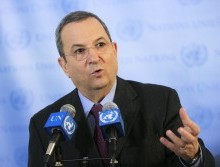With the lack of formal progress in the latest round of nuclear negotiations between Iran and world powers in the background, Israeli Defense Minister Ehud Barak warned that Tehran is playing for time. In comments to an Israeli think tank and released by his office, Barak said his country cannot pretend the threat doesn’t exist.
“Israel, unlike other countries, does not have the option, I repeat… Israel does not have the option to ignore this challenge,” said Barak, who has expressed concern in the past regarding the timeframe for stopping Iran.
On Wednesday, the Israeli defense official again said Iran is trying to reach an “immunity zone” for their program.
“Their aim is to play for time until they become firmly consolidated in the immunity zone; a status by which they have the ability to make the decision to develop nuclear weapons or facilities, or to reach the immediate threshold, i.e. the ability to become a nuclear power in a very short time, when no one can interfere,” said Barak.
Speaking at a security conference hosted by The Institute for National Security Studies (INSS), Barak further noted there is a point when it is too late to respond.
“When people talk about nuclear capabilities, you cannot wait until the capabilities are acquired, built or deployed and only then act,” said Barak. “Because then it is too late, you will be unable to act, there will be nothing you can do. Therefore the crucial moment is the last moment, [when] the metaphorical sword is pressed closely against your neck.”
Nuke Talks Scrutinized
Nuclear negotiations between Iran and the P5+1—the United States, the United Kingdom, France, Russia, China and Germany—concluded last week without any apparent breakthroughs, although both sides made offers. Another round of talks is scheduled for Moscow in mid-June.
In his comments to the INSS on Tuesday, Israeli Prime Minister Benjamin Netanyahu lamented the lack of progress in diplomacy on Iran. In comments published on the Prime Minister’s Office website, Netanyahu said the world powers had backtracked on their demands on Iran regarding nuclear fuel enrichment.
He said previously the world had called on Iran to stop all uranium enrichment, but now they were willing to allow Tehran to continue low-level enrichment. Netanyahu again called for Iran to be required to stop all enrichment, remove all enriched nuclear materials from its territory and dismantle an underground nuclear facility.
“On the one hand, it is good that they are imposing heavy economic sanctions on Iran. This is a positive and important thing. We asked for it, and I must say with satisfaction that this pressure is being put on Iran,” said the Israeli leader. “However, on the other hand, these sanctions must be accompanied by the demands I outlined. It is the combination of the two that will lead to the stopping of the Iranian nuclear program.”
Netanyahu, who was warned that Iran might take small steps in order to continue their overall nuclear ambitions, reiterated that concern on Tuesday. Despite worries that Iran’s enrichment to a nuclear medical research level exceeds civilian use, Netanyahu believes that stopping such efforts is not the only action Iran needs to take.
“It is very possible that the Iranians will temporarily stop their enrichment at 20%, but that is not enough. The test will be if the Iranians will agree to stop all enrichment, remove all enriched material and to dismantle their underground nuclear facility at Qom. This is the test and there is no other.”
American spokesman Mark Toner, in comments to the press released by the US State Department, repeated the US stance that negotiations with Iran can’t continue indefinitely.
“We’ve said that all along, that there’s a narrow window that remains open for dialogue, for diplomatic solution, but that window’s not going to remain open forever,” said Toner on Wednesday.
He said they are “looking towards” the next round with Iran and the P5+1 and that they “want to see additional progress.”
“These are negotiations,” he said. “This takes a long time. What we did have was a substantive discussion of the nuclear issue, which in and of itself is progress, but we’re going to look forward to greater progress in Moscow.”
Barak, meanwhile, also shifted the focus off of Israel on the Iranian matter when he expressed the fear that a nuclear Iran would lead to a “regional nuclear arms race.”
“Iran is aspiring for hegemony not only in the Muslim world, but also in the region. It is motivated by an extreme radical Islamist ideology, and nuclear capability would only give it a further boost,” said Barak.
(By Joshua Spurlock, www.themideastupdate.com, May 30, 2012)

